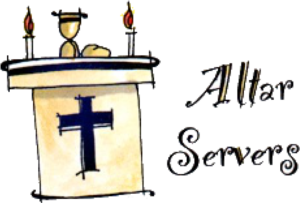The ministry of altar service draws its history from the example of the disciples with Jesus. The disciples are seen in the Gospel bringing loaves and fish to Jesus in order to feed the crowd of 5,000 people (John 6:8) and in preparing for the Last Supper with Jesus (Matthew 26:19).
Altar servers perform most of the functions of the former “minor order” of ordained clerics known as acolytes from the Greek word akolouthos or ‘attendant’. Church writings from the second and third centuries discuss the role of acolytes, giving the office great importance and honor in the history of the Church.
The primary role of the altar server is to assist the priest in the celebration of Mass and liturgy. This is done through specific actions and duties assigned to them.In our diocese there is a strong tradition of children and teenagers serving at Mass, often beginning in primary school and continuing into secondary school.
Training Altar Servers
- Two parishioners might take on the responsibility of guiding the formation of servers and ensuring diocesan safeguarding children are followed.
- Make contact with interested individuals through the schools and through a notice in the parish newsletter – obviously the consent of parents is necessary
- Children and parents should be clear in advance about what commitment is expected of them regarding the formation sessions and the frequency of serving.
Formation
As with any ministry in the Church, formation before beginning, and continuous formation during their ministry is important for altar servers. They are often very competent in what they do, but it is important that they also know why they are doing it.
- Initial formation should happen over at least two sessions
- It is advisable to have beginners serving with established servers
- Ensure there are sufficient and appropriate vestments for them
Stages of Formation
- Beginners should be aware of walking in procession, bowing/genuflecting, carrying items from the credence table to the altar, and ringing the bell during Mass.
- Once comfortable with the above, servers should be aware of holding, opening and closing the thurible, carrying the Cross and candles in procession, and holding the missal for the presider when at the chair.
- Particular formation is necessary for such occasions as Palm Sunday, the Easter Triduum, and Mass presided by the bishop when acolytes attending to his mitre and crozier are needed.
It’s worth remembering…
- By their nature children can be curious, especially around rituals or objects they see to be unusual. Foster that curiosity and develop a rapport where they can ask questions.
- As with any ministry, ensure that the faith of the server is being nourished – there can be the danger of servers being seen as do-ers only.
- Trust them and thank them – it enables them to take ownership for their ministry.
- Mol an óige agus tiocfaidh siad – praise and encourage servers in what they do.





